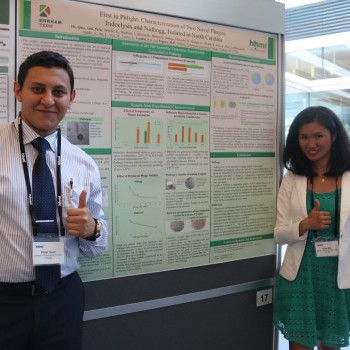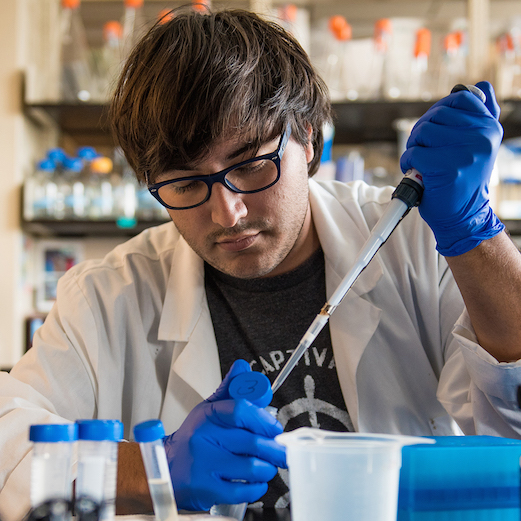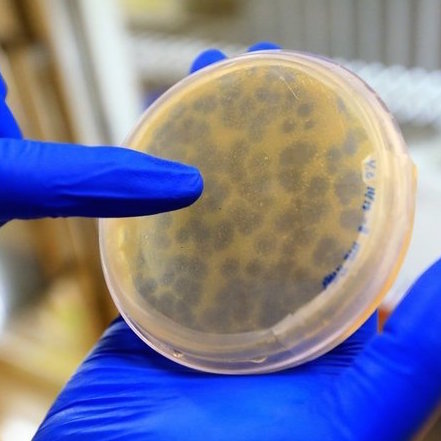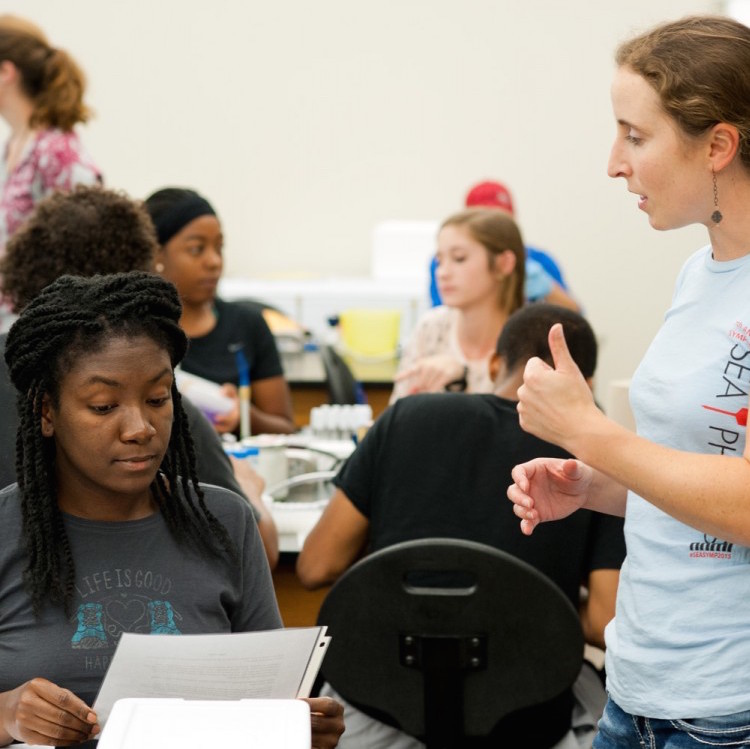Below we've collected articles—from a variety of sources—that are related to the SEA-PHAGES program. If you know of an article that should be added to this collection, please contact us and let us know about it!

Gonzaga—The Magazine of Gonzaga University | Aug. 15, 2016
They may have goofy names, but these students’ microscopic pets are serious science. A junior in college, Vina Tran already has a bona fide scientific discovery to her name. Go ahead and look her up on the Actino-bacteriophage Database, a compendium of biological findings maintained by the University of Pittsburgh....read more
Related institution: Gonzaga University

Durham Tech students present research at national symposium
Chapelboro.com | June 27, 2016
Two Durham Tech students were given the chance to present their research at a national symposium earlier this month. Qina Mo and Peter Said presented their research describing the isolation and characterization of two viruses that infect bacteria at the 8th annual SEA-PHAGES Symposium...read more
Related institution: Durham Technical Community College

Students isolate potentially novel soil-dwelling viruses
Phys.org | June 8, 2016
After sifting through soil samples collected from across Massachusetts, then drilling down to analyze the DNA of viruses they found, a team of undergraduates at Worcester Polytechnic Institute (WPI) hit pay dirt—three potentially novel viruses.... read more
Related institution: Worcester Polytechnic Institute

Biology major chosen for research at MIT
FGCU 360 | June 2, 2016
Santiago Yori already has research experience under his belt that most biology majors would envy. But he’s taking it to a new level this summer working alongside scientists at the Massachusetts Institute of Technology. A veteran of FGCU’s elite Honors “Virus Hunters”...read more
Related institution: Florida Gulf Coast University

Steele commended by Nobel Prize winner for her work
Archer County News | April 21, 2016
It is not often that a freshman in college is approached and commended for research by a Nobel Prize winner, but that is exactly what happened to Archer City graduate, London Steele, now a freshman at Baylor University....read more
Related institution: Baylor University

Queens University student discovers a virus strain
The Charlotte Observer | April 16, 2016
Sydney Dishman’s new pet isn’t cute and certainly isn’t something you’d want to cuddle with. But she feels good just thinking about it. Her “pet” is named Rex16, after the Queens University of Charlotte mascot and her year of graduation. Rex16 is a bacteriophage species she discovered while completing her honors research thesis, investigating bacteriophages in local soil samples....read more
Related institution: Queens University of Charlotte

Del Mar student takes home award for research on bacteriophages
Corpus Christi Caller Times | March 29, 2016
Before John Ramirez, 29, decided to go back to school, he worked at Northwest Hospital in Calallen. There, he saw how tuberculosis affected people. "It's almost intensified when you see it," Ramirez said....read more
Related institution: Del Mar College

Students in interactive course look to discover, name phages
Western Carolina News | Sept. 30, 2015
Western Carolina University student Sean Kent didn’t pick the course, but when he saw he was registered for it, the name “Phage Hunters” immediately got his attention. Brooke Burns also found she was placed in the course. After hearing so many other freshmen at orientation say they were excited about WCU’s newest biology/chemistry course, she, too, decided to keep it. Now she says it’s by far her favorite....read more
Related institution: Western Carolina University

Going viral: C of I students attend HHMI symposium
The College of Idaho—Student News | Aug. 4, 2015
Jetblade. The name might sound like the newest Marvel superhero to hit the big screen, but it’s actually the newest bacterial virus analyzed by College of Idaho students....read more
Related institution: College of Idaho

Student ‘Virus Hunters’ publish research in peer journal
FGCU 360 | July 2, 2015
Students and faculty involved in FGCU’s “Honors Virus Hunters” course helped produce a research paper that has been accepted for publication in eLife, a highly ranked peer-reviewed scientific journal for the biomedical and life sciences....read more
Related institution: Florida Gulf Coast University
